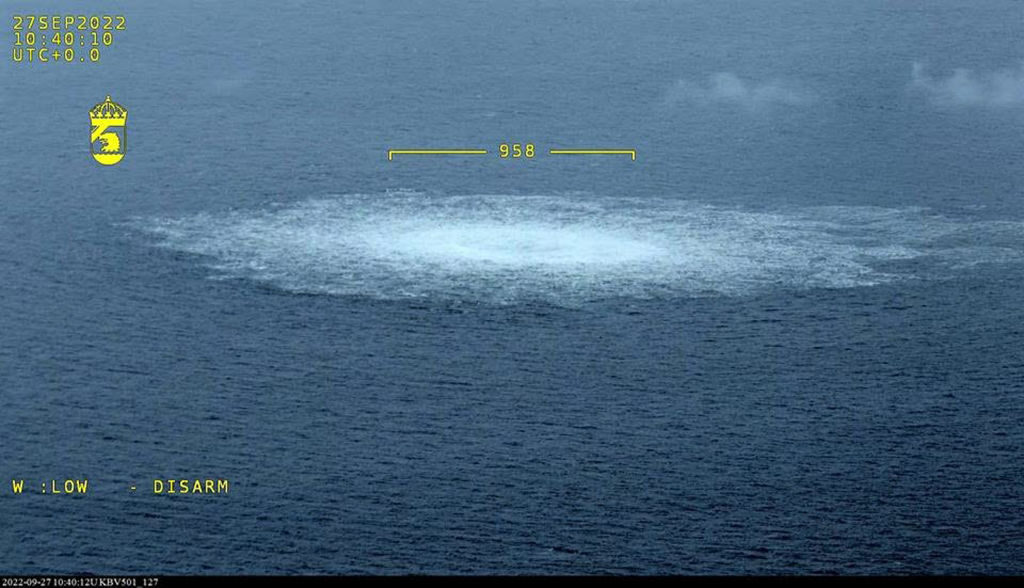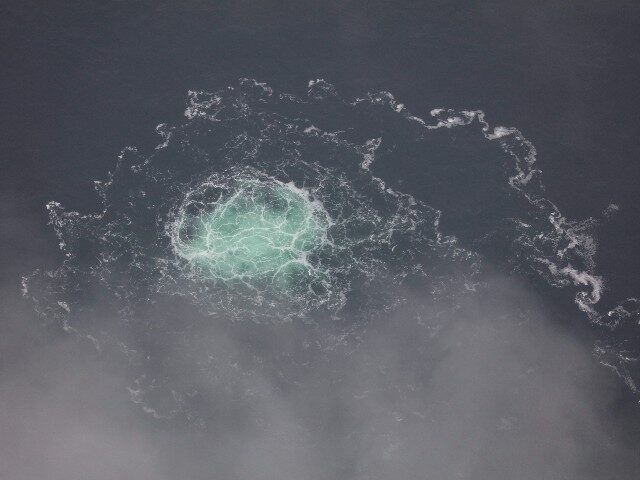Chinese Deputy Representative to the United Nations Geng Shuang urged the world to organize an “objective, impartial, and professional investigation” into multiple leaks on the Nord Stream pipelines connecting Russia and Europe in remarks to the United Nations this weekend.
Geng, previously a spokesman for the Chinese Foreign Ministry, emphasized that communist China was willing to “work with all parties” to aid global security, but stopped short of offering China as a potential party to investigate the incidents.
The Nord Stream and never-used Nord Stream 2 pipelines began leaking last week, causing the dramatic eruption of geysers of natural gas in the Baltic Sea. The pipelines served to help Russia quickly and efficiently sell natural gas, used for heating and other fuel needs, to much of Europe. Multiple government parties implicated by the leaks, which effectively mean Russia will not be able to provide natural gas to Europe to heat homes this winter, have indicated that early investigations suggest “sabotage” against the pipelines.
Preliminary intelligence shared by governments has yet to point to one definitive culprit, though various European nations have suggested Russia could have attacked its own lucrative pipeline; Moscow has loudly accused the administration of leftist American President Joe Biden of destroying the pipelines to cut Russia off from a critical economic resource.
The Nord Stream pipelines have been the source of years of controversy. Under President Donald Trump, Washington sanctioned the Nord Stream 2 project, partially at the behest of Ukraine, whose leaders have argued that Russia uses the profits from selling natural gas to Europe to fund its military. Biden removed sanctions on Nord Stream 2 last summer; less than a year later, Vladimir Putin announced a full-scale invasion of Ukraine.

In this Handout Photo provided by Swedish Coast Guard, the release of gas emanating from a leak on the Nord Stream 2 gas pipeline in the Baltic Sea on September 27, 2022 in At Sea. (Swedish Coast Guard via Getty Images)
The government of Sweden announced on Monday that it had deployed a vessel to conduct “advanced diving missions” in the area and collect evidence on the current status of the pipelines.
China is one of Russia’s closest allies on the world stage but has conspicuously refused to endorse Putin’s invasion of Ukraine. Ukraine is a member of China’s Belt and Road Initiative (BRI), a global debt-trap program China uses to influence poor countries, and Ukrainian President Volodymyr Zelensky has asked Beijing for greater involvement in the ongoing Ukraine war. Chinese dictator Xi Jinping has yet to answer Zelensky’s call for personal talks.
During a United Nations Security Council meeting on Friday, China’s representative at the briefing, Geng, called the leaks a potential “attack on transnational civilian facilities and submarine pipelines” that may be a threat to the entire world.
“We note that some countries indicates [sic] that the leaks this time are not an accident, but very likely the result of deliberative sabotage,” Geng said in his statement. “If true, this would constitute an attack on transnational civilian facilities and submarine pipelines, in violation of UNCLOS [U.N. Convention on the Law of the Sea] and other international laws.”
“We also note that all stakeholders agree that an objective, impartial, and professional investigation into the leaks is essential. As the briefers stressed just now, the leaks this time highlight the vulnerability of transnational infrastructure,” Geng concluded. “We are ready to work with all parties to maintain the security of cross-border infrastructure.”
The Chinese Foreign Ministry has yet to take any questions or make any comment on the Nord Stream leaks during its regular briefings at press time. Saturday was China’s “national day,” the anniversary of the fall of China to communism, so the Foreign Ministry will likely not hold briefings this week.
Trump Vindicated: Nord Stream 2 Pipeline Deal Was Merkel’s ‘Biggest Mistake’, Says Former EU Chief https://t.co/fu2NiaT1i1
— Breitbart London (@BreitbartLondon) November 29, 2021
Russia reportedly requested the Security Council meeting that took place on Friday to discuss the pipeline situation. Moscow announced at the meeting that it had launched its own criminal investigation into the incident – apparently not “impartial” or “professional” enough for China, and concluded that only “State or State-controlled actors” could have successfully damaged the pipeline.
America’s representative at the meeting expressed support for a European, but not Russian, investigation into the matter.
While the Chinese Foreign Ministry has not commented, the government-run newspaper Global Times has suggested that the true authors of the alleged sabotage may remain a “forever mystery” and suggested an opportunity for China to sell refined oil to Europe to replace the lost natural gas supply. The Global Times is also one of the few entities in the world to refer to the leaks as an “accident,” defying the many countries implicated that have claimed sabotage is responsible.
“As the EU has struck a deal to ban most Russian oil imports, Europe has to look for other sources as it increases its imports, experts said, adding that China, with sufficient spare capacity, could be one of the sources,” the Global Times suggested last week. “China has an advantage in exporting refined oil products because it has excess capacity and high refining efficiency compared with other countries, Lin Boqiang, director of the China Center for Energy Economics Research at Xiamen University.”
Follow Frances Martel on Facebook and Twitter.

COMMENTS
Please let us know if you're having issues with commenting.